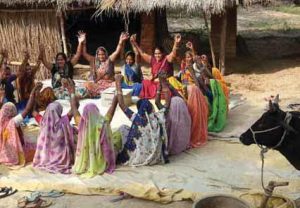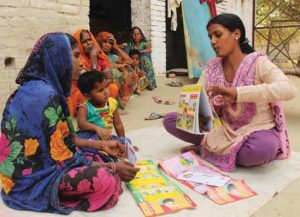
Non- profit Rajiv Gandhi Mahila Vikas Pariyojana (RGMVP)* approached the issue of women empowerment by deciding to experiment with collectives. After all, if a single empowered woman could change her destiny and of others around her then what can collective strength of many women achieve. RGMVP started working for the empowerment of the rural poor by organizing them into self-sustaining institutions with an objective to bring about a socio economic revolution in Uttar Pradesh, the most populous State of India. The model remains markedly different from subsidy or charity-based approaches towards poverty reduction. Today, the efforts of RGMVP are directed towards making its initiatives self- sustainable and easily scalable. Moreover, RGMVP is focusing on the process of institution building wherein the community is organized to address various issues concerning their lives such as healthcare, education, financial inclusion, and livelihoods including environmental initiatives like sustainable agriculture and solar energy solutions. As of date, it has organised over one million women from poorest households in 275 blocks across 42 districts of UP.

Thus the women SHGs organised by RGMVP were not only used to provide financial and banking services and facilitate entrepreneurship through credit facilitation but also the collective was adapted to be used as focal point for delivering range of health and education services. It was seen that by organising the poor women and enabling them to build their own social capital to address various issues that plague them, great impact can be had on their development. The programme is wholly owned and managed by the community. The facilitators and l eaders are drawn from the community and they in turn help their peers develop their leadership potential making the programme self- sustainable. Here interventions are not top down but are allowed to grow and flourish organically from within the community. The varied nature of these programmes come together to not only generate development outcomes but also empower women.
eaders are drawn from the community and they in turn help their peers develop their leadership potential making the programme self- sustainable. Here interventions are not top down but are allowed to grow and flourish organically from within the community. The varied nature of these programmes come together to not only generate development outcomes but also empower women.
 Community-based health care is provided through the Swasthya Sakhi Programme, wherein volunteers are identified from within the community to train as Swasthya Sakhi (Friend for Health) and undergo regular training and meetings to facilitate women’s healthcare awareness and ensure their access to healthcare institutions. Several studies conducted by the organisation have noted marked improvements in terms of number of women seeking antenatal care, consuming iron pills for anaemia, and being trained in good behavioural practices.
Community-based health care is provided through the Swasthya Sakhi Programme, wherein volunteers are identified from within the community to train as Swasthya Sakhi (Friend for Health) and undergo regular training and meetings to facilitate women’s healthcare awareness and ensure their access to healthcare institutions. Several studies conducted by the organisation have noted marked improvements in terms of number of women seeking antenatal care, consuming iron pills for anaemia, and being trained in good behavioural practices.
The programme is wholly owned and managed by the community. The facilitators and leaders are drawn from the community and they in turn help their peers develop their leadership potential making the programme self- sustainable. Here interventions are not top down but are allowed to grow and flourish organically from within the community.
The varied nature of these programmes come together to not only generate development outcomes but also empower women
 Sessions of political training are effectively delivered through such collectives. Training sessions about the Panchayati Raj and its election processes led to around 1000 rural women of the programme, with no prior political experience, to contest the recent Panchayati Raj elections in Uttar Pradesh. Almost half the women won and went on to take leadership role in their community, prioritising their needs, and emerging as decision makers in a context where women are sometimes not even allowed to leave their homes without a veil. The training to prepare women for greater political participation is ongoing with a self-replicating strategy; women who win, in turn help others in their community, not just in terms of accessing their rights and entitlements but in becoming future leaders in their own right.
Sessions of political training are effectively delivered through such collectives. Training sessions about the Panchayati Raj and its election processes led to around 1000 rural women of the programme, with no prior political experience, to contest the recent Panchayati Raj elections in Uttar Pradesh. Almost half the women won and went on to take leadership role in their community, prioritising their needs, and emerging as decision makers in a context where women are sometimes not even allowed to leave their homes without a veil. The training to prepare women for greater political participation is ongoing with a self-replicating strategy; women who win, in turn help others in their community, not just in terms of accessing their rights and entitlements but in becoming future leaders in their own right.
Agriculture-based activities include community-based seed management programme which aims at sourcing foundation seeds from agricultural universities, producing own seeds and then exchanging these with the farmer communities. Similarly, women are leading a programme to produce 18-day compost through the Berkeley Method of hot composting. This method is not only cost effective and efficient but has also led to considerable improvement in women’s incomes and consequently their nutrition outcomes.
RGMVP’s primary focus has also been on cow/ buffalo rearing and best practices of dairy management to improve milk yield . These include animal management and hygiene, animal nutrition, clean milk production, animal breeding and artificial insemination, and disease control. After training, women have an option of tying up with Mother Dairy, which has set up Bulk Milk Coolers (BMC) in UttarPradesh to promote procurement and timely payment.
 Skill development is provided through vocational training centres where SHG women are trained for candle making, modha making, tailoring, compost making, training on agriculture, chikan handicraft, readymade garments etc. Community – based tailoring schools enable women to be financially independent by teaching them sewing, service, and repair.
Skill development is provided through vocational training centres where SHG women are trained for candle making, modha making, tailoring, compost making, training on agriculture, chikan handicraft, readymade garments etc. Community – based tailoring schools enable women to be financially independent by teaching them sewing, service, and repair.
Recently RGMVP has conceptualised Young Women’s Self-Help Group (YWSHG) with the objective of enabling young women to develop health awareness, leadership qualities, life skills, livelihood skills, and financial literacy. The goal of these YWSHGs is to trigger a generational change, disrupt the cycles of oppression and misinformation, and to promote a more equitable, free, healthy, and safe life. YWSHGs comprise of young women and adolescent girls aged 13-21 years, cutting across demographic categories of caste, religion, and class. They are trained in areas ranging from journalism to livelihood activities like stitching, embroidery; they can become apprentice trainers in health, hygiene and financial literacy.
However one of the most effective and interesting by-product of this approach of women collectives was that coming together of women on a common platform led to breaking of rigid feudal hierarchies. Women connected on shared gender concerns and this led them to finding common and effective solutions. By questioning the hierarchies imposed on them due to casteism and patriarchy, the women freed themselves of bondages and restrictions which had plagued them historically.
These collectives also provide women shared safe spaces to discuss common concerns and develop a supportive social network. They learn from each other’s experiences and by sharing stories of oppression, discrimination or violence they may face, they realise that their issues are symptomatic of patriarchy and hierarchies and can be addressed by challenging the patriarchal mindsets.
One interesting example of this was a chappal rally organised by the SHG women of Bundelkhand area where women from ‘lower castes’ were not allowed to wear chappals (slippers) in front of the houses of ‘upper castes’. The women, despite facing resistance and threats, managed to challenge the tradition which was founded on humiliation and discrimination and which had persisted through generations.
The goal of these YWSHGs is to trigger a generational change, disrupt the cycles of oppression and misinformation, and to promote a more equitable, free, healthy, and safe life. YWSHGs comprise of young women and adolescent girls aged 13-21 years, cutting across demographic categories of caste, religion, and class
In fact, it is seen that women in these SHGs have greater mobility, are less likely to practice seclusion, question patriarchal and discriminatory customs and practices, and this has a cataclysmic effect on other women from the community. Furthermore, such an empowered woman affects all development outcomes positively. An empowered woman marries later, is more likely to be educated and be better employed, more likely to make informed choices and be aware of her civil and political rights. Moreover, empowered women are more likely to adopt newer technologies, experiment with newer methods in health and agriculture, use contraceptives and menstrual pads and toilets and send their children to school. Women empowerment serves as a good indicator when it comes to measure how other development indices are faring. Women empowerment has been found to be positively co-related to children’s education and number of years spent in school, lower fertility and better nutrition outcomes for the family. Women empowerment has a cataclysmic effect on the whole community and changes the social landscape for the better, making i t more equitable and progressive. Through organising these women collectives, RGMVP is creating agents of change and bringing about a social revolution in the rural landscape of Uttar Pradesh.
Dr. Swati Saxena is Research Lead at a non-profit. She did her PhD in Public Health and Policy from University of London and M.Phil in Development Studies from University of Oxford. Her research interests include social policy, public health, and community development interventions.
Rajiv Gandhi Mahila Vikas Pariyojana (RGMVP) is the flagship poverty reduction programme of the Rajiv Gandhi Charitable Trust (RGCT), which was established to commemorate and take forward the vision of India’s former Prime Minister for the country’s development.

